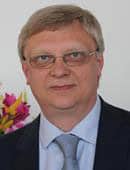
IBTSC is a European higher education institution, which was initially established in Rüschlikon, Switzerland, in 1949, then under the name of International Baptist Theological Seminary. In 1996 the Seminary was relocated to Prague, Czech Republic, with a special aim of responding to the needs of Eastern European Baptists in pursuit of theological education and reflection, in the post-Communist era. Nowadays, after another move in 2014, IBTSC is located in the Netherlands. The Centre today focuses on three main areas: practical theology, contextual missiology and Baptist identity. The MA in Baptistic Histories and Theologies is validated by the University of Manchester, UK. IBTSC is an independent Collaborative Centre within the Theological Faculty of the Vrije Universiteit Amsterdam. Most of our fifty students are on the PhD programme with the Vrije Universiteit Amsterdam. IBTSC has an excellent library in the main fields of research.
All the courses offered are part-time, however the studies require travelling to Amsterdam for intensive teaching blocks, usually once or twice a year. For PhD students the most important meeting point is the Research Colloquium every January. For beginning students the starting intensives take place in August-September. Independent reading, writing, communication by e-mail, Skype and using IBTSC Moodle resources are part of the learning culture of IBTSC. The Centre teachers and students appreciate the intensive teaching and learning sessions in Amsterdam which enable them to build networks, communicate directly, sometimes discuss and debate, and deepen friendships.
IBTSC students fund their studies from different sources: church support and scholarship funds, as well as personal funding. Although the Centre does not offer scholarships, the fees in this European higher education institution are extremely friendly.
Yes, many students at IBTSC are from overseas. The student body at IBTSC is diverse and multicultural, serving the Baptist and wider Christian family – from Armenia and Australia, Cuba and Canada, Norway and the Netherlands, Ukraine and the USA, to name only some countries. Students benefit from interaction with other students – and teachers – from different cultural contexts: a Lebanese Christian perspective may be an eye-opening experience for a British student.
The Centre aims to help students to pursue their calling in life and ministry – some students are engaged in pastoral work, mission or theological education, others are strengthening their knowledge and skills for teaching or research. IBTSC aims to help students to reflect upon their own context: either from the aspect of mission, practical ministry or baptistic identity.
As most of the students are PhD students, almost all of them already work as teachers, pastors, youth workers, mission leaders or they are involved in academic life. However, the experience in IBTSC may open up new opportunities, as the studies offer new horizons and insights, and help to clarify personal calling and ministry goals.
The IBTSC makes a deliberate attempt to enhance theological studies from a baptistic perspective. Strong focus on baptistic (both Baptist and Anabaptist) church traditions gives to these studies a unique colour of identity. However, there is a clear understanding that this can only be strengthened in conversation with other Christian traditions.
The IBTSC library consists of 40 000 carefully selected volumes which strengthen studies in the three key research areas: practice, mission and identity. The online resources, especially the Digital Theological Library, and vast holdings of the Vrije Universiteit Amsterdam library create excellent library opportunities for students and researchers.
IBTSC Amsterdam offers flexible part-time study opportunities, but not online courses.
My thanks to Dr Pilli for his contribution to this new series of interviews with faculty of theological colleges from around the world.
F.F. Bruce's commentary on Paul's first and second letters to the Corinthians in the New…
I was saddened to hear via Tyndale House of the death of Alan Millard, Rankin…
For some time I have been wanting to digitise and make available, free of charge,…
The Association of British Theological and Philosophical Libraries held their Spring Conference in Edinburgh at…
I have always been fascinated by the arguments for and against the unity of the…
Rutherford Centre for Reformed Theology is closing and merging with the Highland Theological College (pictured…